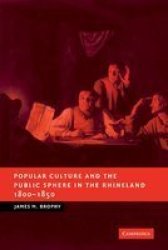Description
This book looks at the ways in which popular culture helped to connect ordinary Germans to the public sphere in the Rhineland during the 1800s. This was a time of political change, as the age of revolution challenged the traditional order of the ancien rgime. This led to the development of a political culture of partisan choice, which undermined the official restoration of absolutism. This book examines the ways in which popular culture helped to connect ordinary Germans to the public sphere, including through the use of culture to communicate political opinions.
The age of revolution challenged the ancien rgime's political world, introducing Europeans to fresh ideals of citizenship. German society was no less affected. Following the Napoleonic era, a political culture of partisan choice undermined the official restoration of absolutism. Bourgeois and popular classes took part in the political landscape of civil society, producing an impressive social base for participatory politics by the 1830s. Because of severe restrictions on speech and assembly, ordinary Germans formed political opinions in irregular ways. This book looks at the sites and forms of culture that facilitated political communication. With chapters devoted to reading, singing, public space, carnival, violence and religion, James Brophy argues that popular culture played a critical role in linking ordinary Rhinelanders to the public sphere. Moving beyond conventional explanations of opinion formation, he exposes the broad cultural infrastructure that enabled popular classes to join the political nation.
